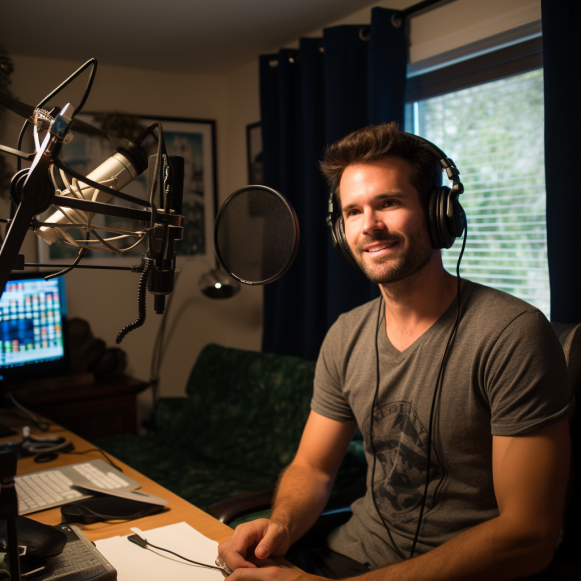I made $107,000 last year doing voice-overs. Here’s how I started with an online course and grew to doing work for Warner Bros, Pepsi, and Google.

- Christopher Tester, an actor, started offering voice-overs on Fiverr in 2017 as a side hustle.
- Within six months, he was making more from his voice-over work than in acting and producing.
- He told Insider about his brand deals and how he had changed his work in response to AI.
This essay is based on an interview with Christopher Tester, a 42-year-old voice-over actor and producer based in London. Insider has confirmed his employment and income. The following has been condensed and edited for length and clarity.
Traditionally, actors obtained voice-over work through their agent. You’d sit there waiting for the phone to ring.
In 2008, I graduated from the Royal Central School of Speech and Drama in London. I spent a decade as an actor, primarily on stage, and as a theater producer.
I’d done a couple of voice-over jobs with the help of my acting agent. They were for video games and commercials, but I wasn’t doing them on a regular basis.
I took a voice-over training course.
In 2016, I discovered Voiceover Kickstart, an online course. It made me realize that doing voice-overs from home with equipment purchased could be done.
People were looking for freelance voice-over talent, according to the course. It also taught me how to record voice-overs from home on a tight budget. For my home studio, I spent £400 on a microphone and software. A duvet propped up over my head served as soundproofing.
I tried everything they taught us in the course, from creating a website and marketing to joining casting websites where you have to pay a subscription fee to access auditions, which cost me a few thousand pounds in the first six months.
In six months, my Fiverr earnings exceeded my theater earnings.
In January 2017, I created profiles on freelancer websites such as Fiverr, Upwork, and PeoplePerHour.
On Fiverr, I had the most consistent traction. I began with low rates. In 2017, I created a profile with a single gig — voice-overs for $5 per 100 words. After two weeks, I got my first job narrating an English course. That amounted to about $50 for 30 minutes of work.
It was the first job I ever had. From there, I gradually grew my clientele.
Within six months of landing my first gig, I was earning more through Fiverr than through any other source, including theater work, bartending, and box office work. In my first year on Fiverr, I earned $26,400.
I reduced my other work and became more selective about the theater work I accepted.
I raised my prices and upsold
I’ve been able to adjust my fees. My starting price is now $20 for 100 words and $5 for every additional 25 words. Aside from that, it’s all about how the voice-over will be used. A global ad campaign is more valuable than narrating a local video. That is something I work out with the client.
I upsold by providing gig extras like extra sounds, proofreading, and audio editing.
I found a niche in corporate voice-overs
I discovered what I was good at through trial and error. I had no idea my voice would be so appealing to corporate clients, but it was.
When I started getting consistent corporate work, I was able to build my brand both on and off the platform.
I included a photo of myself in a suit holding a teacup. It’s a little sarcastic, but I was trying to appeal to that corporate sensibility. It was enjoyable and made me more memorable. It emphasized my voice’s authority, clarity, and trustworthiness in all communication.
Rather than hiring a director, I concentrated on providing quick turnaround and directing my own sessions. I’d self-record multiple takes for this and send them to the client.
I have experience working with international brands.
On Fiverr, I was approached by several brands. In 2018, I voiced a six-month international ad campaign for BMW, which aired primarily in Asia.
Outside of Fiverr, I voiced several characters in 2017 for Warner Bros. video-game franchises, including Lego and Marvel superheroes. In 2019, I worked on a 10-hour internal training program for Pepsi. That year, I worked for Google on a project that explained how people could get their Google business profiles to work.
Working with those high-profile brands, I believe, helped other clients have faith in me.
I made $107,800 on Fiverr last year after deducting the 20% fee, and I’ve made $63,400 this year.
I’ve learned more about the types of work I’m interested in, such as nature documentaries and video game acting.
I’ve delegated work that AI will most likely replace.
I don’t think anyone will be hiring for voice-over work that can be completed quickly and with little performance — such as phone messaging and e-learning — in the next two or three years. They will simply employ artificial intelligence.
To ensure my career longevity, I must choose work where people will still want to hear a human voice.
AI is already causing me issues. Many people have cloned my voice without my knowledge. This year alone, I’ve had three cases of people using my voice for AI voice-overs. I discovered this after being tagged on social media.
Of course, I’m not paid for it, and there are consequences to my voice being associated with something I didn’t choose.
Becoming a TikTok creator has opened up new doors for me.
I’ve started making TikTok content. I perform my own versions of speeches or dialogue, and I solicit audience feedback on what I should perform.
On TikTok, I have 250,000 followers. As a result, I’ve received unexpected opportunities in fields I never expected to work in, such as audiobooks.




